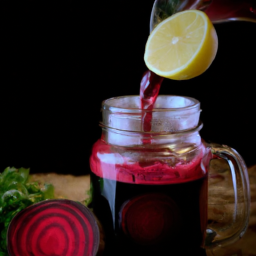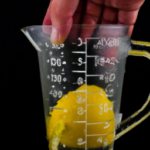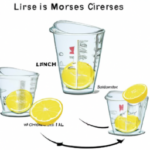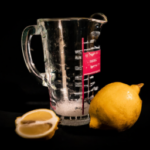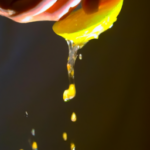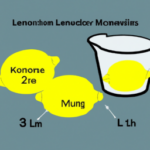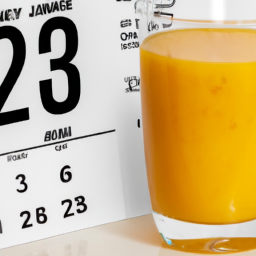The saying “When life hands you lemons, make lemonade” is popular, but have you ever thought about how much juice is in half a lemon? As an avid home cook, I know the importance of accuracy in the kitchen. Even a tiny mistake can ruin a recipe, including using the right amount of lemon juice.
Whether you’re making a salad dressing, marinade, or baking a lemon tart, knowing the exact amount of juice in half a lemon can make all the difference. But determining the amount of juice in a half lemon isn’t always straightforward. There are several factors that can affect the amount of juice you can extract, such as the lemon’s ripeness, size, and variety.
In this article, I’ll dive into the science behind lemon juice extraction, share tips for getting the most juice out of your lemons, and provide common recipes that call for half a lemon. So, grab your juicer and let’s get started!
Key Takeaways
- Half a lemon typically provides 1-2 tablespoons of juice on average.
- Techniques for extracting maximum juice include using a citrus juicer, reamer, rolling, or hands.
- Adjust recipes cautiously when substituting lemon juice, and consider using substitutes such as lime juice, vinegar, or white wine.
- Storing fresh squeezed lemon juice in the fridge keeps it fresh for up to a week, while freezing it in ice cube trays preserves it for future use.
Understanding the Importance of Accurate Measurements in Cooking
You gotta understand the importance of accurate measurements in cooking, or else your dish might turn out as bland as a piece of cardboard. It’s not just about following a recipe, but about ensuring that each ingredient is measured precisely.
The amount of each ingredient can have a significant impact on the taste and texture of the final dish. Precision is key when measuring ingredients. A small variation in the amount of an ingredient can make a huge difference in the taste of the dish.
For example, if a recipe calls for a teaspoon of salt and you accidentally put in a tablespoon, the dish will be overly salty. On the other hand, if you put in too little salt, the dish will be lacking in flavor. So, it’s important to measure each ingredient accurately to achieve the desired result.
Speaking of measurement, let’s talk about the factors affecting the amount of juice in a half lemon.
Factors Affecting the Amount of Juice in a Half Lemon
When I’m cooking, I always want to make sure my measurements are accurate. That means understanding the factors that can affect the amount of juice in a half lemon.
Two key points to consider are the size of the fruit and the ripeness of the lemon. A larger lemon may yield more juice than a smaller one, while a ripe lemon will typically produce more juice than an unripe one.
Size of the Fruit
Hey there, if you’re wondering how much lemon juice is in half a lemon, it all depends on the size of the fruit! Here are three things to keep in mind regarding the size of your lemon:
-
Variation in lemon size: Lemons can range from small to large, and the amount of juice in half a lemon will vary accordingly. Generally, larger lemons will yield more juice than smaller ones.
-
Best time to harvest lemons: The time of year that you harvest your lemons can also affect their size and juice content. Lemons harvested during the peak of their season (typically winter through early spring) will likely be larger and juicier than those harvested later in the year.
-
Squeezing technique: While the size of your lemon plays a big role in how much juice it contains, your squeezing technique can also make a difference. Make sure to roll the lemon on a hard surface before cutting it in half, and then apply firm pressure to extract as much juice as possible.
When it comes to getting the most juice out of your lemon, size is just one factor to consider. Another important factor is the ripeness of the fruit.
Ripeness of the Lemon
The juiciest and most flavorful lemon can be achieved by waiting for the fruit to ripen to its peak, resulting in a burst of tangy and zesty goodness with every squeeze. When choosing ripe lemons, look for those that are heavy for their size and have a firm texture with a slight give when squeezed. Avoid lemons that are too hard or too soft, as they may not yield as much juice or have a less desirable taste.
Using fresh lemon juice has numerous benefits, including enhancing the flavor of dishes, adding acidity to balance out sweetness, and providing a rich source of Vitamin C. Additionally, freshly squeezed lemon juice contains enzymes and antioxidants that help to promote digestion, boost the immune system, and protect against disease. By taking the time to select and use ripe lemons, you can ensure that you are getting the maximum amount of juice and flavor from every fruit.
Now let’s move on to the average amount of juice in half a lemon.
Average Amount of Juice in Half a Lemon
Did you know that squeezing half a lemon can provide a surprising amount of juice? Lemon juice has a plethora of benefits, from adding flavor to dishes to being used in skincare routines.
Lemon juice is rich in vitamin C, which can help boost the immune system and improve skin health. Applying lemon juice to the skin can help reduce blemishes and dark spots, and can also help brighten the complexion.
When it comes to cooking and baking, lemon juice is a versatile ingredient that can be used in a variety of ways. From adding a tangy flavor to marinades and dressings to being used in desserts, lemon juice is a staple in many kitchens.
But how much juice can you expect to get from half a lemon? On average, half a lemon can provide about 1-2 tablespoons of juice. However, the amount of juice can vary depending on the size and ripeness of the lemon. Smaller, less ripe lemons tend to yield closer to 1 tablespoon, while larger or very ripe lemons may give you closer to 2 tablespoons or more. If you’re following a recipe that calls for a specific amount, it’s useful to keep in mind that 1-2 tablespoons is generally considered the half a lemon juice equivalent. Adjust according to your taste preference or the specific needs of your dish.
To get the most juice out of a lemon, there are techniques for extracting maximum juice that can be employed. By rolling the lemon on a hard surface before slicing it in half, you can help loosen the juice from the pulp. Additionally, using a juicer or squeezing the lemon with your hands can help you get the most out of your citrus.
Techniques for Extracting Maximum Juice
To get the most out of your citrus, there are techniques you can use to extract the maximum amount of juice. First, make sure you have the right juicing tools. A citrus juicer is an efficient way to get the most juice out of your lemons. Alternatively, you can use a fork or a citrus reamer to extract the juice by hand.
Second, consider alternative citrus options. While lemons are a popular choice, you can also use limes, oranges, or grapefruits depending on your recipe. Experiment with different citrus fruits to find what works best for you.
Lastly, roll the citrus fruit on a hard surface before juicing to break down the membranes and release more juice. By using these techniques, you can maximize your lemon juice yield and elevate the flavor of your recipes.
When adjusting recipes based on lemon juice amount, keep in mind that the acidity of the lemon juice can affect the overall taste of the dish. Use caution when adjusting the amount of lemon juice in a recipe, as too much or too little can drastically alter the flavor.
Tips for Adjusting Recipes Based on Lemon Juice Amount
When you’re tweaking recipes that call for a touch of tartness, remember that adjusting the amount of citrus can radically transform the flavor profile, so proceed with caution. If you don’t have half a lemon on hand, there are alternative sources of tartness you can use.
Lime juice is a great substitute for lemon juice and can give your dish a slightly different flavor profile. You can also use vinegar or white wine to add acidity to your recipe.
If you’re looking to make a recipe that calls for half a lemon, but you’re not sure how much juice that equates to, there are a few options. On average, one lemon yields about 2-3 tablespoons of juice, so half a lemon would be around 1-1.5 tablespoons. However, if you’re looking for a more precise measurement, you can juice the lemon and measure out the exact amount needed. Keep in mind that the size and ripeness of the lemon can affect the amount of juice it produces, so it’s always a good idea to have an extra lemon on hand if your recipe requires accurate quantities. Measuring lemon juice for recipes is especially important in baking or when balancing flavors in dressings or marinades, as slight variations in acidity can alter the final result. If fresh lemons aren’t available, bottled lemon juice can be used as a substitute, but be sure to check the label for any additives that might impact flavor.
With these tips for adjusting recipes based on lemon juice amount, you can confidently make substitutions and modifications to suit your taste preferences.
Moving on to the next section, let’s take a look at some common recipes that call for half a lemon.
Common Recipes That Call for Half a Lemon
You may have encountered recipes that require a tangy twist, and some of them might call for using a portion of a citrus fruit that is cut equally in two parts. Half a lemon is a common measurement used in many recipes, especially those that require acid to balance out other flavors.
Here are some examples of common recipes that call for half a lemon:
- Lemon vinaigrette: Half a lemon helps to give this salad dressing its tanginess.
- Lemon drop cocktail: This classic cocktail uses half a lemon to give it a citrusy kick.
- Lemon chicken: Half a lemon is often used to marinate chicken and add flavor to the dish.
- Lemon bars: This sweet treat relies on half a lemon to give the filling its signature tartness.
Aside from its culinary uses, lemon juice has many benefits for skincare. Its high vitamin C content helps to brighten and even out skin tone, while its natural acidity can help to exfoliate and unclog pores. Using half a lemon as a DIY facial toner is a popular at-home skincare hack.
Moving forward, let’s explore other uses for lemon juice beyond the kitchen and beauty routine.
Other Uses for Lemon Juice
Lemon juice has a pH level of around 2, making it highly acidic and effective in removing stains from fabrics. But did you know that it’s also a great natural cleaning agent? You can use lemon juice to clean everything from kitchen counters to bathroom fixtures.
Simply mix lemon juice with water and use a cloth or sponge to scrub away dirt and grime. Not only is this method effective, but it’s also eco-friendly and affordable. Another benefit of lemon juice is that it can be consumed daily for health benefits.
Drinking lemon water in the morning, for example, can aid in digestion, boost the immune system, and even help with weight loss. Lemon juice is also high in vitamin C, which is essential for healthy skin, hair, and nails. So, the next time you’re considering using lemon juice solely for cooking purposes, remember all of the other amazing benefits it has to offer.
Speaking of cooking, when it comes to storing and preserving lemon juice, there are a few steps you can take to keep it fresh for longer.
Storing and Preserving Lemon Juice
I often wonder if bottled lemon juice is a suitable substitute for freshly squeezed lemon juice.
I am curious about how long I can store leftover lemon juice in the fridge before it goes bad.
Another question that comes up is whether lemon juice can be used as a replacement for vinegar in certain recipes.
In this discussion, I’ll explore these three key points related to storing and preserving lemon juice.
Can I Substitute Bottled Lemon Juice?
Honestly, sometimes it’s just easier to grab the bottled lemon juice, but will it really give you the same flavor as fresh squeezed? While substituting fresh lemon juice with bottled juice may seem like a convenient and time-saving option, it’s important to keep in mind that the taste and quality of your dish may be affected.
Fresh lemon juice has a bright, tangy flavor and aroma that cannot be replicated by bottled juice. The processing and preservation methods used for bottled lemon juice may also affect its quality and taste. When substituting fresh lemon juice with bottled juice, it’s important to consider the effect it may have on your recipe’s taste.
The acidity and flavor of fresh lemon juice can vary depending on the type of lemon and its ripeness, which may affect the balance of flavors in your dish. Bottled lemon juice, on the other hand, is typically standardized and may not provide the same level of acidity or flavor as fresh juice. While it may be tempting to opt for the convenience of bottled juice, it’s important to weigh the potential impact on your recipe’s taste and adjust accordingly.
In terms of storing and preserving lemon juice, it’s important to know how long it will last in the fridge.
How Long Does Lemon Juice Last in the Fridge?
You’ll be happy to know that storing fresh squeezed lemon juice in the fridge can keep it fresh for up to a week. This is great news for those who only need a small amount of lemon juice for recipes or drinks. However, what do you do with the leftover juice? There are actually many uses for leftover lemon juice, such as adding it to water for a refreshing drink, using it as a marinade for meat or fish, or even using it as a natural cleaning solution.
If you have more leftover lemon juice than you know what to do with, the best way to preserve it is by freezing it. Freezing lemon juice is a great way to make sure you always have fresh lemon juice on hand whenever you need it. Simply pour the juice into an ice cube tray and freeze. Once the cubes are frozen, transfer them to a freezer bag and label with the date. These lemon juice ice cubes can then be used in recipes or thawed for a refreshing drink.
Now that you know how to store and preserve your fresh lemon juice, you may be wondering if you can use it as a substitute for vinegar. Stay tuned for the next section where we’ll explore this topic further.
Can I Use Lemon Juice Instead of Vinegar?
Substituting lemon juice for vinegar is a great option for adding acidity to recipes. Not only does lemon juice provide a tangy flavor, it also offers various health benefits. Lemon juice contains high levels of Vitamin C, which helps boost the immune system and aids in digestion. Additionally, lemon juice has been shown to have anti-inflammatory properties and can even help prevent kidney stones.
While both lemon juice and vinegar are acidic, there are some differences between the two. Lemon juice has a milder taste compared to vinegar and can provide a subtle citrus flavor to dishes. On the other hand, vinegar has a stronger taste and can overpower other flavors in a recipe.
Additionally, lemon juice is a great option for recipes that require fresh ingredients, while vinegar is often used in pickling and preserving foods. Ultimately, the choice between lemon juice and vinegar will depend on the specific recipe and personal preference.
Frequently Asked Questions
Can you use bottled lemon juice instead of fresh lemon juice in recipes?
I use bottled lemon juice in cocktails for convenience, but prefer fresh lemon juice for salad dressings. Advantages of bottled lemon juice include longer shelf life and consistent flavor, but fresh juice provides more complexity of flavor.
Is the amount of juice in a lemon affected by its ripeness?
As I’ve squeezed countless lemons, I’ve noticed that the ripeness affects the amount of juice extracted. Ripe lemons yield more juice, but are softer and harder to handle. Proper lemon juice extraction techniques are crucial for optimal results.
How long can you store fresh lemon juice in the refrigerator?
I store fresh lemon juice in the refrigerator for up to a week. It’s perfect for making homemade lemonade recipes. To keep it fresh, I use an airtight container and label it with the date.
Can you freeze fresh lemon juice for later use?
Oh sure, go ahead and freeze that fresh lemon juice for your lemonade recipe. Because nothing screams "refreshing summer drink"like thawed, watery lemon juice. But if you insist on freezing, make sure to use airtight containers and consume within six months for best preservation.
Are there any health benefits to drinking lemon juice?
Drinking lemon juice has numerous health benefits such as aiding digestion, boosting immunity, and reducing inflammation. It is also a popular ingredient in detox diets due to its ability to flush out toxins from the body.
Conclusion
Well, there you have it. Knowing how much lemon juice is in half a lemon is crucial for any home cook or baker. With the average amount of juice being around 2 tablespoons, it’s important to use the right techniques for maximum extraction.
Adjusting recipes based on the amount of lemon juice needed is also key to achieving desired flavors.
Did you know that a single lemon tree can produce up to 600 pounds of lemons in a year? That’s enough to make over 3,000 batches of lemonade using half a lemon each time!
It’s amazing to think about the abundance of this citrus fruit and all the delicious recipes that can be made using its juice. So, the next time you’re in the kitchen, don’t forget about the humble lemon and all the possibilities it holds.
Susannah expertise lies in researching and compiling evidence-based content on juicing, nutrition, and overall health. She is committed to ensuring that The Juicery World offers accurate, up-to-date, and trustworthy information to empower readers to take control of their health. Susannah’s goal is to inspire individuals to embrace juicing as a way to nourish their bodies and live their best lives.


